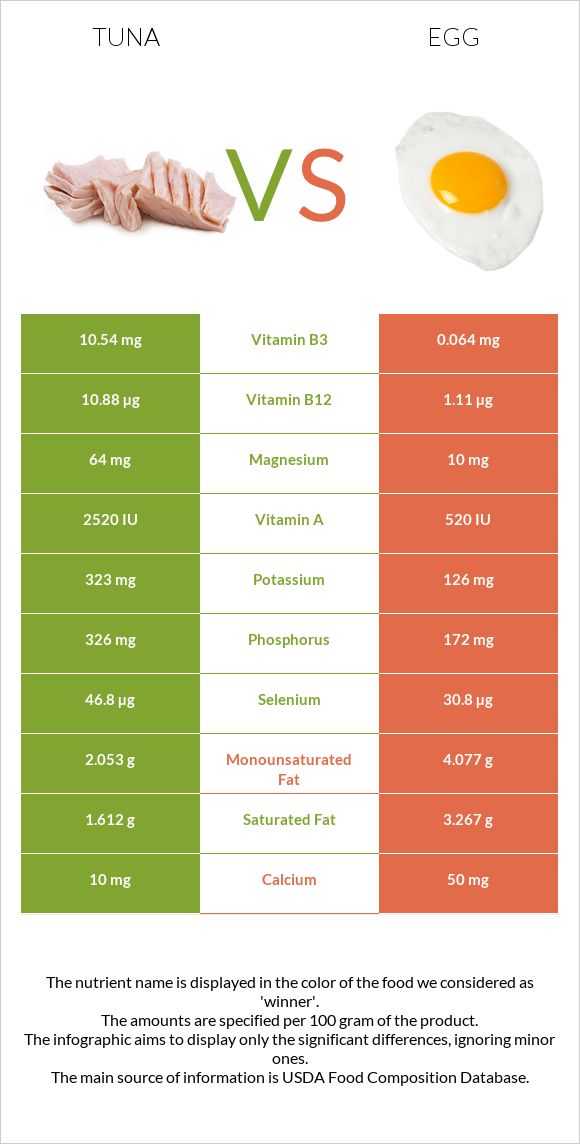Tuna vs. Egg — In-Depth Nutrition Comparison
Compare
Significant differences between tuna and eggs
- Tuna has more selenium, vitamin B3, vitamin B6, vitamin B12, and phosphorus; however, eggs are richer in copper, choline, vitamin B2, and vitamin B5.
- Eggs cover your daily copper needs 217% more than tuna.
- Eggs have 345 times less vitamin B3 than tuna. Tuna has 22.07mg of vitamin B3, while eggs have 0.064mg.
- Tuna contains less cholesterol.
Specific food types used in this comparison are Fish, tuna, yellowfin, fresh, cooked, dry heat and Egg, whole, cooked, hard-boiled.
Infographic

Infographic link
Mineral Comparison
Mineral comparison score is based on the number of minerals by which one or the other food is richer. The "coverage" charts below show how much of the daily needs can be covered by 300 grams of the food.
| Contains more MagnesiumMagnesium | +320% |
| Contains more PotassiumPotassium | +318.3% |
| Contains more PhosphorusPhosphorus | +93.6% |
| Contains less SodiumSodium | -56.5% |
| Contains more SeleniumSelenium | +251.3% |
| Contains more CalciumCalcium | +1150% |
| Contains more IronIron | +29.3% |
| Contains more CopperCopper | +4551.2% |
| Contains more ZincZinc | +133.3% |
| Contains more ManganeseManganese | +100% |
Vitamin Comparison
Vitamin comparison score is based on the number of vitamins by which one or the other food is richer. The "coverage" charts below show how much of the daily needs can be covered by 300 grams of the food.
| Contains more Vitamin B1Vitamin B1 | +103% |
| Contains more Vitamin B3Vitamin B3 | +34384.4% |
| Contains more Vitamin B6Vitamin B6 | +757.9% |
| Contains more Vitamin B12Vitamin B12 | +111.7% |
| Contains more Vitamin AVitamin A | +577.3% |
| Contains more Vitamin EVitamin E | +255.2% |
| Contains more Vitamin B2Vitamin B2 | +274.5% |
| Contains more Vitamin B5Vitamin B5 | +318.6% |
| Contains more Vitamin KVitamin K | +200% |
| Contains more FolateFolate | +2100% |
| Contains more CholineCholine | +278.6% |
All nutrients comparison - raw data values
| Nutrient |  |
 |
DV% diff. |
| Copper | 0.043mg | 2mg | 217% |
| Selenium | 108.2µg | 30.8µg | 141% |
| Vitamin B3 | 22.07mg | 0.064mg | 138% |
| Cholesterol | 47mg | 373mg | 109% |
| Vitamin B6 | 1.038mg | 0.121mg | 71% |
| Vitamin B12 | 2.35µg | 1.11µg | 52% |
| Choline | 77.6mg | 293.8mg | 39% |
| Protein | 29.15g | 12.58g | 33% |
| Vitamin B2 | 0.137mg | 0.513mg | 29% |
| Phosphorus | 333mg | 172mg | 23% |
| Vitamin B5 | 0.334mg | 1.398mg | 21% |
| Fats | 0.59g | 10.61g | 15% |
| Vitamin A | 22µg | 149µg | 14% |
| Saturated fat | 0.205g | 3.267g | 14% |
| Potassium | 527mg | 126mg | 12% |
| Folate | 2µg | 44µg | 11% |
| Monounsaturated fat | 0.138g | 4.077g | 10% |
| Magnesium | 42mg | 10mg | 8% |
| Polyunsaturated fat | 0.175g | 1.414g | 8% |
| Vitamin B1 | 0.134mg | 0.066mg | 6% |
| Zinc | 0.45mg | 1.05mg | 5% |
| Vitamin E | 0.29mg | 1.03mg | 5% |
| Calcium | 4mg | 50mg | 5% |
| Iron | 0.92mg | 1.19mg | 3% |
| Sodium | 54mg | 124mg | 3% |
| Calories | 130kcal | 155kcal | 1% |
| Manganese | 0.013mg | 0.026mg | 1% |
| Vitamin D | 2µg | 2.2µg | 1% |
| Vitamin D | 82IU | 87IU | 1% |
| Carbs | 0g | 1.12g | 0% |
| Net carbs | 0g | 1.12g | N/A |
| Sugar | 0g | 1.12g | N/A |
| Vitamin K | 0.1µg | 0.3µg | 0% |
| Trans fat | 0.02g | N/A | |
| Tryptophan | 0.313mg | 0.153mg | 0% |
| Threonine | 1.224mg | 0.604mg | 0% |
| Isoleucine | 1.287mg | 0.686mg | 0% |
| Leucine | 2.27mg | 1.075mg | 0% |
| Lysine | 2.565mg | 0.904mg | 0% |
| Methionine | 0.827mg | 0.392mg | 0% |
| Phenylalanine | 1.091mg | 0.668mg | 0% |
| Valine | 1.438mg | 0.767mg | 0% |
| Histidine | 0.822mg | 0.298mg | 0% |
| Omega-3 - EPA | 0.015g | 0.005g | N/A |
| Omega-3 - DHA | 0.105g | 0.038g | N/A |
| Omega-3 - DPA | 0.005g | 0g | N/A |
| Omega-6 - Eicosadienoic acid | 0.002g | N/A |
Macronutrient Comparison
Macronutrient breakdown side-by-side comparison
| Contains more ProteinProtein | +131.7% |
| Contains more OtherOther | +19.6% |
| Contains more FatsFats | +1698.3% |
| Contains more CarbsCarbs | +∞% |
~equal in
Water
~74.62g
Fat Type Comparison
Fat type breakdown side-by-side comparison
| Contains less Sat. FatSaturated fat | -93.7% |
| Contains more Mono. FatMonounsaturated fat | +2854.3% |
| Contains more Poly. FatPolyunsaturated fat | +708% |





